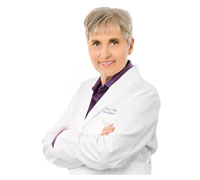Get Easy Health Digest™ in your inbox and don’t miss a thing when you subscribe today. Plus, get the free bonus report, Mother Nature’s Tips, Tricks and Remedies for Cholesterol, Blood Pressure & Blood Sugar as my way of saying welcome to the community!
The real fix for most doctors’ biggest mistake

I made this mistake for most of my professional career. So do nearly all my physician colleagues. My guess is that means most of you are unknowingly falling victim to it too, and that’s why I’m writing to you today.
For decades I thought the best way to take care of my patients was to use the latest drugs and newest procedures. I spent very little time talking to my patients about food, toxin exposure or their activity level. I prescribed meds and moved on the next person as quickly as I could.
I have since learned about the power of epigenetics. That is how factors in our human habitat – that is, how our environment speaks to our genes and can turn genes “on” and “off” – shift how our cells run the chemistry of life.
The scientific term for this is epigenetics. The changes can shift what should have been a healthy, disease-resistant body into an inflamed sickly disease-prone one. Such a shift makes us more likely to develop high blood pressure, obesity, diabetes, heart disease, Alzheimer’s, autoimmunity, cancer and other chronic ills.
What are those environmental factors that are speaking to our genes, shifting which ones are “on” and which are “off”?
It turns out that nearly every factor in our environment can influence our genes. But the two most powerful, in order, are:
- The quality of the diet, whether it provides the vitamins, minerals, essential fats and antioxidants our cells need to conduct the chemistry of life
- Toxin exposures to chemicals that disrupt the hormone signals and biochemical processes in our cells.
Because we rely so heavily on chemicals to improve the efficiency of the manufacturing, agriculture and food industry, these chemicals are now pervasive throughout the environment. In multiple studies, 200-plus chemicals have been found in the cord blood of new babies and the breast milk of new mothers.
All of us have some level synthetic chemicals in our bodies creating epigenetic changes that are shifting which genes are on and which are off and influencing our risk of developing one or more chronic diseases.
Other environmental factors that speak to our genes include physical activity level, stress level, the health of social relationships, sleep quality, and the bacteria living in our bowels (hopefully more friendly bacteria than bad bacteria).
In other words, the quality of our environment or habitat determine which genes are “on” and which are “off” and will have the largest impact, at least 70 percent to 90 percent or more of the risk for developing nearly every chronic disease affecting modern society.
If physicians use only medication to treat disease and do not address the diet and lifestyle factors that contributed to developing the inflamed sickly disease prone body, the underlying diseases will continue to progress. Every year the person will be more ill, need more medication and accumulate more diagnoses.
Medications control symptoms. Diet and lifestyle changes get to the root of sickly disease-prone body and can transform it into a healthy disease-resistant one. My goal is to help you have the healthiest body possible from today forward.
Getting to the root of an inflamed sickly body means addressing diet and lifestyle choices. It may sound tough, but it’s actually easier and smarter than using medication to cover up a modern American diet that puts toxins and pounds of sugar in our bodies each year. Medication can’t do anything about the years of smoking, inactivity, chronic stress, inadequate sleep, toxic relationships, or the excessive lead, solvents or pesticides stored in fat cells.
All of those things are speaking to our genes. Changing the conversation can make a positive change in how our cells run the chemistry of life.












